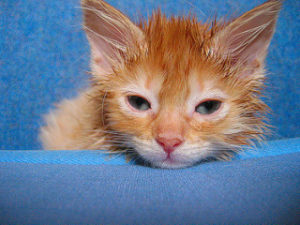It’s heartbreaking to see infants of any species suffer, but sick kittens are particularly adept at pulling the heart strings. One of the most common issues veterinarians see in kittens is intestinal parasites. Pets of any age have intestinal parasites, but they are rife in kittens living in substandard or crowded conditions. Intestinal parasites are generally easy to detect because the symptoms in infected kittens are obvious. We’ll take a closer look the symptoms below.

Why are intestinal parasites in kittens so dangerous?
Kittens have high nutrient requirements. Unfortunately, the parasites cause inflammation of the intestines to the point where kittens can’t absorb the required nutrients for healthy growth. This places the kitten at risk of other health conditions because their parasitic immune system – mucosal immunity – hasn’t completely developed. Building up the immune system against these parasites requires the presence of small amounts of parasites in the intestines.
What are intestinal parasites?
Intestinal parasites include worms, tapeworms, roundworms, hookworms, stomach worms and a variety of different microscopic parasites such as Coccidia, Giardia, and Strongvloides.
Hookworms are transferred through the queen’s (mom’s) milk or while the kittens are still in the womb. Kittens may get roundworms in utero. One of the problems with hookworms and roundworms is they can remain undetected in fecal examinations. Because they affect the kitten’s immune functioning, infected kittens can also suffer badly from fleas, ear mites and the rhinotracheitis virus.
How are they transmitted?
Intestinal parasites are transmitted via contaminated water and fecal matter. Note that the eggs and larvae survive in soil, grass and wet environments for up to 3 or 4 months, so you will have to thoroughly disinfect your home if your kitten is infected.
Many adult cats get infected when they chase and catch small mammals that carry worms. They then pass it on to their kittens. Humans can also get roundworms, hookworms, Coccidia and Giardia. Deworming a pregnant queen is important because of the high risk of transmission from an infected mother to her kittens.
Symptoms of Intestinal Parasites
The symptoms of intestinal parasites are easily detectable and include:
- Vomiting
- Diarrhea
- Black, tarry stool
- Dehydration
- Little to no appetite in general. Tapeworm is the exception, as appetite increases while kitten remains undernourished.
- Anemia
- Skin rashes
- Worms or worm segments present in the feces.
Identifying parasites
Parasites are difficult initially because it’s in their interests to maintain their hosts’ health for as long as possible. Eventually they take their toll, however, as the parasite population explodes and their hosts can no longer cope with or compensate for the infection. Regular prophylactic treatment is essential and while your kitten is still young and vulnerable, you should pay careful attention to her physical health. Even a slight change could indicate the presence of parasites.
The most noticeable of the early signs of intestinal parasites include:
- Poor growth
- Dull coat
- Underweight
- Absence of playfulness
- Low energy
- Diarrhea
- Bony bodies and potbellied tummies
What to do if your kitten is infected
If you suspect your kitten has worms or coccidia, visit your veterinarian immediately. Infected stools are the quickest way to test for parasites, so bring a fecal sample with you. If the result is negative, many veterinarians will conduct another test in case the first result was false. Fecal suspension tests are best for Giardia, Coccidia, and other intestinal protozoa, while fecal flotation tests are best for hookworms, roundworms and whipworms.
If you suspect your mother cat has intestinal parasites that she may transmit to her kittens, collect some stool specimens to take to your vet. Remember to always wear gloves when you gather the fecal specimens from your cat and keep the sample cool and well-sealed. After all, the last thing you want is a container or bag crawling with potentially deadly larvae no one can detect.
If your cat or kitten tests positive for intestinal parasites, veterinarians will prescribe a course of antibiotics (flagyl, Ivomec and Albon® are effective) and probably some probiotics or something to bind your cat’s stomach. Try and encourage your cat to eat plain boiled chicken, which is usually best for intestinal and gastric problems in pets.
Kittens may also appreciate some extra TLC, including extra blankets for softness and perhaps and heating pad to ease discomfort.
